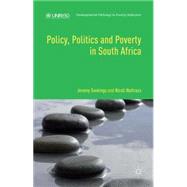When South Africa finally held its first democratic elections in 1994, the country had a much higher poverty rate than in other countries at a similar level of development. This was the legacy of apartheid. Twenty years later, poverty was still widespread. Seekings and Nattrass explain why poverty has persisted in South Africa since 1994. They demonstrate who has and who has not remained poor, how public policies both mitigated and reproduced poverty, and how and why these policies were adopted. Their analysis of the South African welfare state, labour market policies and the growth path of the South African economy challenge conventional accounts that focus only on 'neoliberalism'. They argue, instead, that policies were, in important respects, social democratic. They show how social democratic policies both mitigate and reproduce poverty in contexts such as South Africa, reflecting the contradictory nature of social democracy in the global South.








